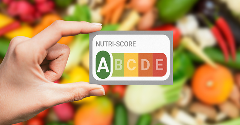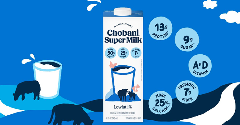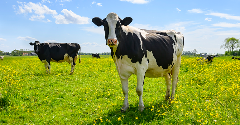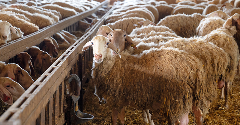News
European Consumers Await Next Generation Functional Dairy Drinks
17 Nov 2014The European dairy industry has operated in a challenging regulatory environment in recent years as the European Food Safety Authority (EFSA) worked its way through a series of health claim dossiers for functional products. A high level of uncertainty and lack of clarity has deterred wider innovation, with just one in five new liquid yogurt […]

The European dairy industry has operated in a challenging regulatory environment in recent years as the European Food Safety Authority (EFSA) worked its way through a series of health claim dossiers for functional products. A high level of uncertainty and lack of clarity has deterred wider innovation, with just one in five new liquid yogurt or cultured milk drinks in Western Europe making functional health claims in 2014, compared to one in three back in 2010.
Given that EFSA has made clear what health claims are permissible, the industry could now look to step up innovation using functional ingredients. Healthier functional dairy drinks represent a good opportunity to optimise brand potential, with well-known brands enjoying greater credibility when it comes to marketing functionality, especially in Italy and Spain. Meanwhile, a sizable minority of all consumers – more than a third in Spain (41%), Italy (38%) and France (35%) according to Mintel research – are ready to buy more functional foods and drinks as they get older. As such, many consumers anticipate a growing need for functional benefits and brands need to address this.
Europe’s aging population and typically affluent senior demographic form an attractive target market for functional dairy food and drink. This is certainly the case for leading brands in cholesterol-reduction and bone health drinks. However, millennials across Europe are both the main demographic for buying dairy drinks in general and for buying those products they consider to have health benefits or contain functional ingredients.
Mintel data suggests that companies should not necessarily focus on the older consumer, and the potential is there for cultivating younger consumers with convenient, on-the-go snack-orientated products sold on a lifestyle platform. Cholesterol and blood pressure, plus preventing cancer and dementia, remain key concerns for seniors, but more general health considerations are almost as important for younger groups, especially in Italy and Spain. In terms of the top drivers for functional food and drink purchase overall – bone health and heart health – millennials are nearly as motivated by these in Italy as older consumers.
As well as the broad appeal of functional benefits like heart, bone and digestive health, it is worth noting that consumers are now very familiar with leading functional ingredients. Between half and two-thirds of all Europeans in the five largest EU economies have heard of, and know what the function is, of vitamin D, omega-3 and added calcium.
In an ideal world, each consumer would have a healthy beverage custom-tailored to suit their particular requirements or concerns, but for the current mass market in dairy it may make greater sense to add more ingredients and accordingly cast the net wider. Very few functional brands now aim to cover more than a single benefit, but this may change with the emergence of more of a checklist approach that offers a single, multiple health benefit solution using a range of well-known ingredients.
Related news

Danone removes NutriScore from products
20 Sep 2024
Following an algorithm update that gives some of its sweetened drinks a worse score, Danone has removed the front-of-pack label, NutriScore, from all of its products – putting profit before public health, say campaigners.
Read more
Chobani develops shelf-stable, prebiotic-enriched Super Milk
12 Sep 2024
Chobani has launched a prebiotic-enriched, shelf-stable, high-protein dairy milk to support people in disaster zones who need a nutritious drink that does not require refrigeration.
Read more
Tesco trials methane mitigation supplement for dairy cattle
5 Sep 2024
Tesco is trialing a methane-reducing feed supplement for one of its key UK dairy farms, sustainable UK milk producer Grosvenor Farms.
Read more
Sheep and goat plague: A new threat to Greece’s feta production
27 Aug 2024
A recent goat and sheep plague outbreak threatens feta production in Greece. The flagship product accounts for roughly 10% of the country’s food exports, but Greek authorities say there is no cause for concern.
Read more
Nestlé develops a new fat reduction method for dairy ingredients
26 Aug 2024
A Brazil-based Nestlé research and development team has developed a way to reduce the fat in milk powder by as much as 60%, without impacting the key characteristics that consumers enjoy.
Read more
Dutch court rules against plant-based butter brand ‘Roombeter’: Only dairy products allowed to use the word ‘cream’
26 Jul 2024
A Dutch court has ruled against Upfield’s plant-based butter, Roombeter, stating that its use of the word ‘room’ (cream) in the product name violates European regulations that protect dairy-related terms allowed for dairy products only.
Read more
How will Denmark’s 2030 carbon tax impact farming?
12 Jul 2024
Denmark has announced plans to implement Europe’s first carbon tax on agriculture from 2030, targetting the farming sector’s CO2 emissions. How will it be implemented and how have farmers reacted?
Read more
Sweden updates front-of-pack Keyhole labelling rules
11 Jul 2024
The Swedish Food Agency has announced updates to the voluntary Keyhole logo, used in four Nordic countries, following recommendations to improve nutrition labelling.
Read more
Consumers dislike faba beans’ sensory profile
3 Jun 2024
Consumers display low acceptance of faba beans, with sensory properties such as bitterness a core concern, a study suggests. However, for product varieties such as cocoa-free chocolate, this attribute could prove to be a benefit.
Read more
Food scientists uncover new way to preserve nutrient and flavour quality
29 May 2024
Researchers have developed a method that guarantees food safety for low-moisture products, such as dried milk, while maximising quality by retaining vitamins, minerals, and flavours, they say.
Read more